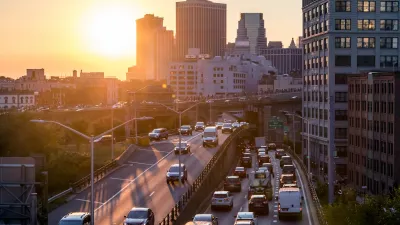The long-awaited congestion pricing program began on January 5.

New York City’s congestion pricing program is now in effect (you can trace the saga of the controversial program on Planetizen’s archives), and Dave Colon of Streetsblog NYC has all the facts you need to know as a, NYC driver or resident.
As Colon explains, “At the most basic level, the toll to drive into the area of Manhattan below 60th Street has a peak period from 5 a.m. to 9 p.m. Monday through Friday, and 9 a.m. to 9 p.m. on Saturday and Sunday. The remaining hours are considered the ‘overnight’ period.”
The cost to enter the congestion pricing zone varies for passenger cars, small trucks and charter buses, tractor trailers, intercity buses and school buses, tour buses, motorcycles, yellow or green cabs, and ride-hailing service vehicles. Costs for passenger vehicles are $2.25 off-peak and $9 at peak hours. Tolls are roughly 50 percent higher for drivers without at E-Z Pass.
Colon reminds readers that the $9 toll was lowered from a proposed $15 rate, and that “The vast majority of people who get into the central business district use transit — and those who drive are, on average, wealthier than their transit-using neighbors.”
Congestion pricing is expected to raise $500 million per year, funds that will go toward public transit in the region. As Colon notes, “In the world of big money borrowing, congestion pricing is a totally separate and new revenue stream from the MTA's normal fare- and toll-backed revenues that the agency has used to pay off its bonds. Congestion pricing is that rarest of things in politics: a reliable revenue stream.”
FULL STORY: Congestion Pricing Has Begun! Here is the ONLY Explainer You Need

Planetizen Federal Action Tracker
A weekly monitor of how Trump’s orders and actions are impacting planners and planning in America.

Congressman Proposes Bill to Rename DC Metro “Trump Train”
The Make Autorail Great Again Act would withhold federal funding to the system until the Washington Metropolitan Area Transit Authority (WMATA), rebrands as the Washington Metropolitan Authority for Greater Access (WMAGA).

DARTSpace Platform Streamlines Dallas TOD Application Process
The Dallas transit agency hopes a shorter permitting timeline will boost transit-oriented development around rail stations.

Supreme Court Ruling in Pipeline Case Guts Federal Environmental Law
The decision limits the scope of a federal law that mandates extensive environmental impact reviews of energy, infrastructure, and transportation projects.

Texas State Bills to Defund Dallas Transit Die
DART would have seen a 30% service cut, $230M annual losses had the bills survived.

Bikeshare for the Win: Team Pedals to London Cricket Match, Beats Rivals Stuck in Traffic
While their opponents sat in gridlock, England's national cricket team hopped Lime bikes, riding to a 3-0 victory.
Urban Design for Planners 1: Software Tools
This six-course series explores essential urban design concepts using open source software and equips planners with the tools they need to participate fully in the urban design process.
Planning for Universal Design
Learn the tools for implementing Universal Design in planning regulations.
Roanoke Valley-Alleghany Regional Commission
City of Mt Shasta
City of Camden Redevelopment Agency
City of Astoria
Transportation Research & Education Center (TREC) at Portland State University
US High Speed Rail Association
City of Camden Redevelopment Agency
Municipality of Princeton (NJ)





























